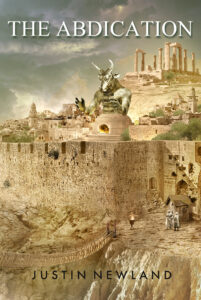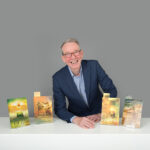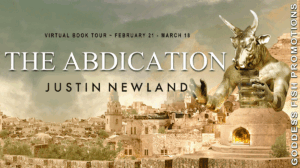 Today’s special guest author is Justin Newland and we’re chatting about his new supernatural crime thriller, The Abdication.
Today’s special guest author is Justin Newland and we’re chatting about his new supernatural crime thriller, The Abdication.
During his virtual book tour, Justin will be awarding a $75 Amazon or Barnes and Noble (winner’s choice) gift card to a luck randomly drawn winner. To be entered for a chance to win, use the form below. To increase your chances of winning, feel free to visit his other tour stops and enter there, too!
Bio:
Justin Newland is an author of historical fantasy and secret history thrillers – that’s history with a supernatural twist. His stories feature known events and real people from history which are re-told and examined through the lens of the supernatural. He gives author talks and is a regular contributor to BBC Radio Bristol’s Thought for the Day. He lives with his partner in plain sight of the Mendip Hills in Somerset, England.
His Books:
The Genes of Isis is a tale of love, destruction and ephemeral power set under the skies of Ancient Egypt. A re-telling of the Biblical story of the flood, it reveals the mystery of the genes of Isis – or genesis – of mankind. ISBN 9781789014860.
“The novel is creative, sophisticated, and downright brilliant! I couldn’t ask more of an Egyptian-esque book!” – Lauren, Books Beyond the Story.
The Old Dragon’s Head is a historical fantasy and supernatural thriller set during the Ming Dynasty and played out in the shadows of the Great Wall of China. It explores the secret history of the influences that shaped the beginnings of modern times. ISBN 9781789015829.
‘The author is an excellent storyteller.” – British Fantasy Society.
Set during the Great Enlightenment, The Coronation reveals the secret history of the Industrial Revolution. ISBN 9781838591885.
“The novel explores the themes of belonging, outsiders… religion and war… filtered through the lens of the other-worldly.” – A. Deane, Page Farer Book Blog.
The Abdication is a crime thriller, a journey of destiny, wisdom and self-discovery.
ISBN 9781800463950.
“In Topeth, Tula confronts the truth, her faith in herself, faith in a higher purpose, and ultimately, what it means to abdicate that faith.”
V. Triola, Coast to Coast.
Welcome, Justin. Please tell us about your current release.
The Abdication is a departure from my normal genre. The previous three novels were all based in historical or semi-historical settings, but this wasn’t the case with The Abdication.
The premise of the novel is set out in the preface, as follows:
“When a man loses his way, he feels desperate.
When a nation abandons its purpose, it slides into anarchy.
When Homo sapiens shuns its nature as the wise, the kind and the humane, it can only be called… The Abdication.”
The story is about free will, and about how Homo Sapiens Sapiens – that’s man the twice-wise – has employed that gift. Before free will, we were like animals, in that we had no voluntary choice. We could only do what we were pre-coded to do. With free will, we could and do code or program ourselves.
The novel tells the story of a young woman’s journey to explore whether or not we have abdicated from the right and proper use of free will.
What inspired you to write this book?
My novels speculate on the human condition and explore the fundamental questions of our existence. As a species, as Homo sapiens sapiens – that’s man the twice-wise – how are we doing so far? Where is mankind’s spiritual home? What does it look or feel like? Would we recognise it if we saw it?
In The Abdication, I wanted to explore humanity’s relationship with the deity. Is there one? If so, what is it like? Is it changing? Are we ready for the change? The story deals with the themes of human nature, greed, evolution and the human’s place in the universe.
Excerpt from the opening of The Abdication:
Tula’s swollen ankle ached as she trudged up the mountain. It had moaned incessantly, ever since she had left her home in the city before embarking on this journey. Then again, it had always hurt. Perhaps since birth; she could never remember that far back. She had complained to her parents, who could not afford to get it seen by the doctor.
A gust of wind whipped up particles of sand which spiralled in the fractious air ahead of her. She squinted and pulled her keffiyeh up to cover her nose. At this altitude, the air was a thin gruel, offering paltry nourishment. Her gut was rumbling, but that was nothing new. She had walked uphill all afternoon from Seliga in the valley below and now she was gasping for breath. Her backpack seemed to weigh as much as that boulder up ahead. A vulture circled effortlessly in the azure blue sky. There was another one above the next valley; griffon vultures searching for prey, as long as they left her alone.
Wisps of straw-coloured grass sprouted beside the graves of an unkempt cemetery. The top of the surrounding low stone wall was speckled with reddish spots, like splashes of copper rain. A few of the gravestones had fallen over and kissed the parched earth. This was the summit of a mountain and even the grand old yew trees huddled in one side of the cemetery were bending to the east, bowing to the omnipotent goddess of the winds in her distant unseen shrine.
Between the cemetery and the town lay a vibrant carpet of blue thorns; large cones of tiny blue flowers surrounded by a spiky, electric-blue collar.
Up ahead were the town walls, shimmering in the waves of heat rising from the scorched land. Finally, her journey’s end was in sight. On the side of the road just outside the town’s South Gate was the Welcome Boulder. It towered above her, which was not that difficult because in the city she was constantly mocked as the shortest amongst her peers. Most of the boulder was coated in that brownish-red dust. Towards the top of it was the immortal sign that declared the town’s identity;
Welcome to Topeth.
The First Free Town and
‘The Top’ Town of all.
Feel free to listen to some excerpts from the novel here.
What exciting story are you working on next?
It’s set in Elizabethan England. At the time, Spain was by far the richest and most powerful European nation with huge resources, a massive Empire and a colossal fleet of ships. But in 1588, its navy, the great Armada, was repulsed by a disorganised bunch of English renegades, pirates and buccaneers. How could that be? That’s my Work In Progress, a supernatural re-telling of the story of the most unlikely defeat and repulse of the Spanish Armada.
 When did you first consider yourself a writer?
When did you first consider yourself a writer?
I think there are many hurdles to overcome before a person can consider themselves a writer. I think a writer needs to acquire a range of skills, and you don’t realise what they all are, until you’ve written a novel or two, attempted different structures, sorted out the management of the material, battled with yourself to do proof-reading, and learned how to ‘kill your babies’ by acquiring ruthless editing skills. In amongst it all, and perhaps most important of all, is the writer’s relationship with his or her imagination.
A good writer is keenly aware of timing, that is, when to introduce a character, or a plot twist, or a reveal. A good writer will know about balances; about how and when to change the dynamic, by introducing poetry, or some other higher register.
The imagination is important to everyone, and most important to the writer. The Ancient Greeks called it their muse – and there are nine of them. Nine.
And how many is the right number of drafts? Who knows? The writer, perhaps. I’ve found that each novel is different, has different timings, length, quality, tensions, and so who can tell how many drafts it needs? My last novel had nearly twenty drafts. It depends how much the writer wants to get it right.
So, out of all that, I consider myself a writer, but I want to be the best writer that I can be.
Do you write full-time? If so, what’s your work day like? If not, what do you do other than write and how do you find time to write?
I don’t write full-time. I write when I can, in between looking after the house, spending quality time with my lady, promoting my books and writing, and generally communicating by email, message, phone or zoom with friends. Other than writing, I like to read and research. To chill out, I’ll watch crime dramas on TV and live sport.
What would you say is your interesting writing quirk?
I recently read that everything we do, everything we see, everything that has been created has in one way or another, come through our imagination, so it makes sense that the most important assistant an author has is their imagination.
And not only conscious, or semi-conscious, but the unconscious has an imagination too.
If I’m stuck on a scene, and not knowing how to write it, I’ll invoke the boys in the basement (as Stephen King calls the unconscious).
Then, just before going to sleep, I’ll call over the scene I’ve got stuck on. Often, on waking, I’ll have an idea of how to write it.
As a child, what did you want to be when you grew up?
An explorer.
Anything additional you want to share with the readers?
Find your passion in life, and then keep following it.
Links:
Website | Facebook | LinkedIn | Amazon | Barnes and Noble | Indigo Chapters | Troubador | Waterstones

